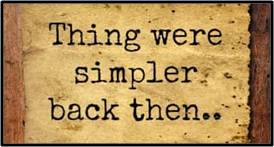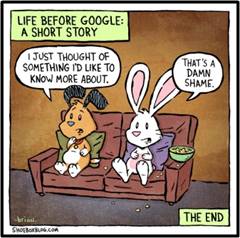Monday Author: Susanne Skinner
“When I was your age…” ~ Moms and Dads Everywhere
The older I get, the more it feels like the world I live in belongs to someone else. The frenetic pace of life demands so much of us and lately I’ve been thinking about the way things used to be.
 I grew up in simpler times when working and living was less complicated. Long before the Internet and my smart phone I managed nicely with a push-button wall phone, a remoteless TV and no cable. I did not miss what I didn’t have.
I grew up in simpler times when working and living was less complicated. Long before the Internet and my smart phone I managed nicely with a push-button wall phone, a remoteless TV and no cable. I did not miss what I didn’t have.
Technological advances, which I champion, have a dark side. They keep us from being connected the way we used to be. High tech removes the human connection we once had and replaces it with risks we never had. I accepted these changes but they come at a cost.
Risky Business
Living in today’s world has risks that were not present thirty, twenty or even two years ago. Advances in the sciences, medicine and technology have cast a spotlight on inequality, crime, greed, disease, and terror. It’s not that they weren’t there before; but we have the ability to see and hear them in real time. We aren’t dependent on the evening newspaper or Walter Cronkite—we get Google alerts.
The cost of living rises exponentially. Income disparity means even two wage earners in a family are hard pressed to keep pace with the today’s cost of living. We’ve convinced ourselves we need more, want more and will somehow be less if we do not exhibit material signs of our success. It costs more to live and more to retire, and it will be nothing like the retirement our parents had.
Our lives reflect the technology we use to govern them. The Internet of Things makes all things possible and we expect instant gratification. Even I cannot imagine life without Amazon Prime.
But I did have a life without it. When I think of then and now the first thing that comes to mind is shopping and banking. Shopping was done in a store. I drove there, paid with cash or a check, and drove home. Once I forgot my check book and drove home with no groceries because the store did not take credit cards.
There were no ATMs, no on-line banking (no computer) and by default, no cybercrime. I went to the bank on my lunch hour or Saturday morning. I made my home in a blue-law state, which prohibited retail shopping on Sunday. Stores were closed.
Gov. Edward J. King repealed that law in 1983 because Massachusetts was losing business to neighboring states just a short drive away. Until that happened, Sunday really was a day of rest. I try hard to continue that practice, fail more often than I succeed, and challenge myself to do better each week.
The Google Life
There was a Time Before Google. Like most people in my age group, I grew up with the Encyclopedia Britannica—all 24 volumes—sitting in the living room bookcase. (The last edition, printed in 2010 boasts 32 volumes.) When I had questions or homework research, that’s where I was sent, along with the directive to “look it up.” I would also ask my parents, relatives, friends and teachers. You know…conversation.
 Today Google is the default search engine for all of us and for Millennials there is no other reference point. If they find themselves in the library, it’s because they need a computer. I am spoiled by technology but I do not want it to define me or insulate me.
Today Google is the default search engine for all of us and for Millennials there is no other reference point. If they find themselves in the library, it’s because they need a computer. I am spoiled by technology but I do not want it to define me or insulate me.
Several years ago the New York Public Library started a social media campaign to showcase the questions librarians used to get before Google, using the hashtag #letmelibrarianthatforyou. They covered everything from the kind of apple Eve gave Adam to an inquiry from a baby carriage manufacturer who wanted to know if the library had a list of women who were pregnant. The curiosity and variety remain, but it’s much easier to find answers and no human interaction is required.
Typing keywords in the search bar and receiving an answer 10 seconds later is more practical, but it takes away the magic of discovering it on your own. It was rewarding when I researched and discovered answers in books. I would not give up my computer or Google but I never see an encyclopedia without a twinge of nostalgia.
A Simpler Life
Our culture tells us more is better. I am on the opposite side of that goal where less is better. I not only ask “do we need this” but also “can we live without this?”
 Life does not simplify itself. When we make our lives more complicated we invite the clutter, stress and anxiety that come with it. We create the lives we are living and only we can unmake the by-products of a messy life. You can’t have a simple life if you’re unwilling to let go of what you’re used to and figure out what you need.
Life does not simplify itself. When we make our lives more complicated we invite the clutter, stress and anxiety that come with it. We create the lives we are living and only we can unmake the by-products of a messy life. You can’t have a simple life if you’re unwilling to let go of what you’re used to and figure out what you need.
We live in a consumer-driven culture. Getting rid of some of life’s density gives back time and money, two of the most valuable resources we have. It means we get to spend more time with people we love and do more of the things we love. When you make these changes, what remains is what you value.
Despite the conveniences, life can actually be pretty simple when you measure yourself against your own expectations instead of someone else’s. The reward is more energy, more space, and more financial flexibility. You also find more peace of mind.
The result is more quality of life with less of the other stuff: distractions, anxiety, frustration, clutter, and fatigue. Channeling simplicity from the way things used to be helps you chose what is rewarding instead of what is easy.
